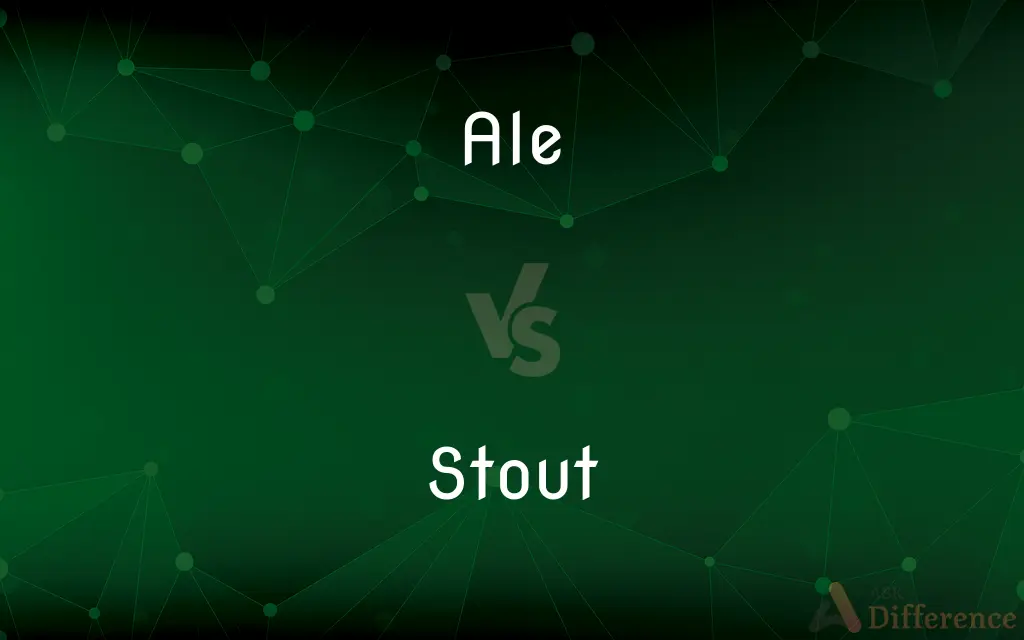Ale vs. Stout — What's the Difference?
By Tayyaba Rehman — Updated on September 25, 2023
"Ale" is a type of beer brewed from malted barley using a warm fermentation, while "Stout" is a dark, rich beer, often with coffee or chocolate notes.

Difference Between Ale and Stout
Table of Contents
ADVERTISEMENT
Key Differences
"Ale" and "Stout" both belong to the world of beers, but their brewing process, flavor profiles, and histories set them apart. "Ale" is a broad category that encompasses a variety of beer styles. It's characterized by its use of top-fermenting yeasts that ferment at warmer temperatures. This fermentation method often imparts fruity notes to the ale, making it diverse in flavor.
In contrast, "Stout" is a subtype of ale known for its dark color, thick consistency, and deep flavors, often resembling coffee or chocolate. The dark character of stout stems from roasted malt or roasted barley used in its production. This roasting results in a bold, rich taste that many stout enthusiasts adore.
It's noteworthy that "Ale" covers a range of beers from light pale ales to dark brown ales, indicating its versatility. "Stout," although an ale, has a more niche appeal, with its full-bodied texture and pronounced taste. Both ales and stouts can vary in alcohol content, with some ales being light and some stouts being quite potent.
Both beverages have deep roots in brewing history. "Ale" is an ancient form of beer and has been brewed for millennia. "Stout" has its origins in stronger versions of porters, eventually becoming its own distinct style, particularly popular in countries like Ireland.
Comparison Chart
Type
Broad beer category
Subtype of ale
ADVERTISEMENT
Color
Varies, can be light to dark
Dark
Flavor Notes
Often fruity due to fermentation
Roasty, often with coffee or chocolate notes
Fermentation
Top-fermenting yeast, warm
Top-fermenting yeast, specific roast used
Historical Origin
Ancient beer form
Originated from porters
Compare with Definitions
Ale
Contains top-fermenting yeast.
The fruity notes in this ale are due to its yeast.
Stout
A dark, thick beer with deep flavors.
He savored the stout's rich chocolate undertones.
Ale
Broad category encompassing many beer styles.
From pale ales to brown ales, he loved them all.
Stout
Stout is a dark, top-fermented beer with a number of variations, including dry stout, oatmeal stout, milk stout, and imperial stout. The first known use of the word stout for beer, in a document dated 1677 found in the Egerton Manuscripts, referred to its strength.
Ale
A beer brewed using a warm fermentation method.
He enjoyed a cold ale on a sunny afternoon.
Stout
Bulky in figure; thickset or corpulent.
Ale
Often lighter in color than stouts.
The golden hue of the ale was inviting.
Stout
Strong in body; sturdy
Added a stout defensive end to improve the front line.
Ale
Brewed for millennia with a rich history.
Ales have been part of ancient cultures around the world.
Stout
Thick or strong in structure or substance; solid or substantial
"They met a stout barrier of old farm-carts upturned" (J.R.R. Tolkien).
Ale
Ale is a type of beer brewed using a warm fermentation method, resulting in a sweet, full-bodied and fruity taste. Historically, the term referred to a drink brewed without hops.As with most beers, ale typically has a bittering agent to balance the malt and act as a preservative.
Stout
Having or marked by boldness or determination; resolute
Stout of heart.
Ale
A usually full-bodied beer that has been fermented at a relatively warm temperature.
Stout
Stubborn or uncompromising
Put up stout resistance to the proposal.
Ale
A serving of this beer.
Stout
Having a strong flavor
A cup of stout coffee.
Ale
(dated) A beer made without hops.
Stout
A thickset or corpulent person.
Ale
A beer produced by so-called warm fermentation and not pressurized.
Stout
A garment size for a large or heavy figure.
Ale
A festival in English country places, so called from the liquor drunk.
Stout
A very dark ale or lager beer.
Ale
An intoxicating liquor made from an infusion of malt by fermentation and the addition of a bitter, usually hops.
Stout
Large; bulky.
Ale
A festival in English country places, so called from the liquor drunk.
Stout
(obsolete) Bold, strong-minded.
Ale
A general name for beer made with a top fermenting yeast; in some of the United States an ale is (by law) a brew of more than 4% alcohol by volume
Stout
(obsolete) Proud; haughty.
Stout
Firm; resolute; dauntless.
Stout
Materially strong, enduring.
Campers prefer stout vessels, sticks and cloth.
Stout
Obstinate.
Stout
(beer) A dark and strong malt brew made with toasted grain.
Stout is darker, stronger and sweeter than porter beer.
Stout
An obese person.
Stout
A large clothing size.
Stout
Gnat.
Stout
Gadfly.
Stout
(dialectal) Firefly or miller moth.
Stout
To be bold or defiant.
Stout
To persist, endure.
Stout
Strong; lusty; vigorous; robust; sinewy; muscular; hence, firm; resolute; dauntless.
With hearts stern and stout.
A stouter champion never handled sword.
He lost the character of a bold, stout, magnanimous man.
The lords all standTo clear their cause, most resolutely stout.
Stout
Proud; haughty; arrogant; hard.
Your words have been stout against me.
Commonly . . . they that be rich are lofty and stout.
Stout
Firm; tough; materially strong; enduring; as, a stout vessel, stick, string, or cloth.
Stout
Large; bulky; corpulent.
Stout
A strong, dark malt brew having a higher percentage of hops than porter; strong porter; a popular variety sold in the U. S. is Guinness' stout.
Stout
A strong very dark heavy-bodied ale made from pale malt and roasted unmalted barley and (often) caramel malt with hops
Stout
A garment size for a large or heavy person
Stout
Dependable;
The stalwart citizens at Lexington
A stalwart supporter of the UN
Stout hearts
Stout
Euphemisms for `fat';
Men are portly and women are stout
Stout
Having rugged physical strength; inured to fatigue or hardships;
Hardy explorers of northern Canada
Proud of her tall stalwart son
Stout seamen
Sturdy young athletes
Stout
Contains roasted malt or barley.
The stout's dark color is due to its roasted barley.
Stout
Originally a strong version of porters.
Over time, stout evolved from porters into its distinct style.
Stout
Often associated with flavors like coffee or chocolate.
The stout had a robust coffee aroma.
Stout
A subtype of ale with a full-bodied texture.
The stout had a smooth, velvety texture that lingered on the palate.
Common Curiosities
Are the flavor profiles of ale and stout similar?
While both can be diverse, ales often have fruity notes, and stouts have roasty flavors like coffee or chocolate.
Are both "Ale" and "Stout" types of beer?
Yes, ale is a broad category of beer, and stout is a subtype of ale.
Can a stout be considered an ale?
Yes, stout is a specific kind of ale known for its dark color and rich flavor.
Which is typically darker: ale or stout?
Stout is typically darker due to roasted malts or barley.
Was stout originally a type of porter?
Yes, stout evolved from stronger versions of porters.
What kind of yeast is used in brewing ale?
Ale uses top-fermenting yeast.
What gives stout its coffee or chocolate notes?
The roasted malt or barley used in brewing imparts these flavors to stouts.
Is the term "ale" more ancient than "stout"?
Yes, ale has been brewed for millennia, while stout has more recent origins from porters.
Can I find fruity flavors in stout like in some ales?
While stouts are known for their roasty flavors, some might have subtle fruity undertones, but they're typically more pronounced in ales.
Are ales lighter in alcohol content than stouts?
Not necessarily; both ales and stouts can vary in alcohol content.
Share Your Discovery

Previous Comparison
Wolf vs. Wolverine
Next Comparison
Systolic vs. DiastolicAuthor Spotlight
Written by
Tayyaba RehmanTayyaba Rehman is a distinguished writer, currently serving as a primary contributor to askdifference.com. As a researcher in semantics and etymology, Tayyaba's passion for the complexity of languages and their distinctions has found a perfect home on the platform. Tayyaba delves into the intricacies of language, distinguishing between commonly confused words and phrases, thereby providing clarity for readers worldwide.














































